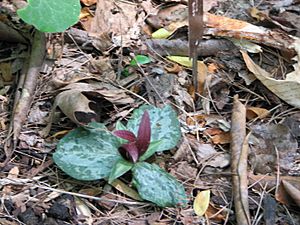Decumbent trillium facts for kids
Quick facts for kids Decumbent trillium |
|
|---|---|
 |
|
| Conservation status | |
| Scientific classification | |
| Genus: |
Trillium
|
| Species: |
decumbens
|
The Decumbent Trillium (scientific name: Trillium decumbens) is a special kind of flowering plant. It is also known as the trailing wakerobin because of how it grows. This plant is part of the Melanthiaceae family.
Contents
About the Decumbent Trillium
This interesting plant is found in the southeastern United States. You can spot it growing naturally in states like Tennessee, Georgia, and Alabama. It likes to live in older forests where trees lose their leaves in winter. It also grows on open, rocky hillsides that have some trees.
What Makes It Special?
A scientist named Thomas Grant Harbison first officially described this plant in 1902. What makes the Decumbent Trillium really unique is how its stems grow. Unlike most other trillium plants that stand tall, its stems spread out along the ground. This makes the plant look like it is resting right on the soil.
Its leaves are also quite pretty. They have a mix of green and bronze colors, with shiny silver patterns on top. These leaves usually die back fairly early in the growing season.
Life Cycle of the Trillium
The Decumbent Trillium is a perennial plant. This means it lives for many years, coming back each spring. It is also an herbaceous plant, which means it has soft stems, not woody ones like a tree.
This trillium blooms in the spring, usually from mid-March to April. Its flowers have petals that are a deep maroon or purple color. After the flower fades, the plant grows a dark purple berry.
A Close Relative: Trillium delicatum
For a long time, some populations of trillium in central Georgia were thought to be T. decumbens. However, scientists now believe these plants are actually a brand new species called T. delicatum.
Even though T. delicatum looks a lot like T. decumbens, it is very different. It has unique genes, different physical features, and grows in slightly different places. This shows how diverse and interesting the plant world can be!


